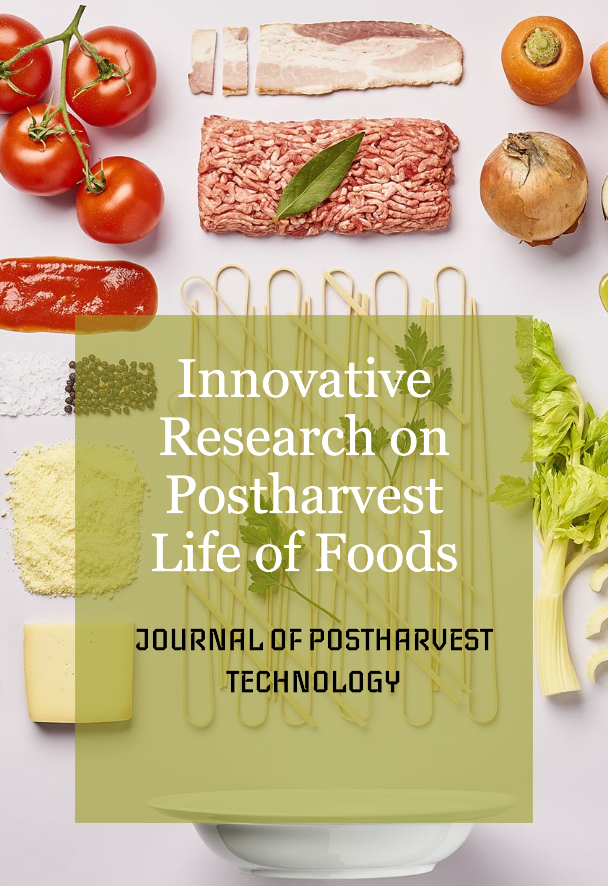Screening Packaging and Biologically Active Cushioning Materials for Postharvest Storage of Litchi
Keywords:
Litchi chinensis, Cushioning, Packaging, Storage, Pericarp browningAbstract
Keeping litchi fruits in its own leaves during marketing is a common practice that provides postharvest protection to the fruits from weight and colorloss. Considering this common practice, the present experiment was carried out to evaluate different combinations of cushioning and packaging materials for enhanced shelf-life and fruit quality of litchi. The results revealed that the litchi fruits stored without stalks in CFB boxes, cushioned with green cassia (Cassia alataL.) leaves recorded the best postharvest quality throughout the storage. The treatment was found the most effective in curtailing physiological loss in weight, browning, and acidity with higher retention of TSS. The fruits kept with stalks in CFB boxes, cushioned with green cassia leaves ranked second in merit, however, it was found effective in reducing spoilage loss of fruitswith higher values of total sugars and ascorbic acid. Begusarai, East and West Champaran and Bhagalpur districts.
References
Barman, K.; Siddiqui, M.W.; Patel, V.B. and Prasad, M. 2014. Nitric oxide reduces pericarp browning and preserves bioactive antioxidants in litchi. Scientia Horticulturae, 171: 71-77.
Baviskar, M. R; D. P. Waskar and S. N. Kaulgad 1995. Effect of various post-harvest treatments of shelf-life and quality of ber fruit. Indian J. Hort. Sci., 52 (1): 37-45.
Emerald, M.E.F. and V.V. Sreenarayanan 1999. Prolonging storage life of banana fruits by sub-atmospheric
pressure. Indian Fd. Packer, 53
(3):22-25.
Fuchs, Y; G. Zauberman; R. Ronen; I. Rot; A. Weksler and Akerman, M. 1993. The physiological basis of litchi fruit pericarp colour retention, Acta Hort., 343: 29-33.
Gomez, A.K. and Gomez, A.A. 1984. Statistical Procedures for Agricultural Research. John Wiley and Sons Inc., New York.
Isherwood, F.A. and L. W. Mapson 1962. Ascorbic acid metabolism in plants, part II. Biosynthesis Ann. Rew, Plant Physiol., 13: 329-330.
Jindal, S; L.S. Beniwal; R. P. Sihag and N. R. Godra 2005. Effect of different types of papers used as cushioning materials as individual wrapping and lining on shelf life of sapota. Haryana J. Hort. Sci., 34 (3-4): 266-267.
Mapson, L.W. 1970. Vitamins in fruits stability of L-ascorbic acid. In Biochemistry of Fruits and their products (Ed. Hulme, A.C.), Academic press, London pp 376-377.
Moreuil, C. 1973. Some observations and experiments on the litchi. Fruits 28:637-640.
Ramesh, C. and R. K. Pal 2006. Influence of active cushioning materials in packaging on shelf-life of litchi fruits. Indian J. Hort., 63 (1): 31-35.
Sharma, R. K.; J. K. Sandooja, R. S. Singhrot and J. P. Singh 1986. Studies on shelf-life on peach cv. Floradasun as affected by various packing
materials. Haryana J. Hort. Sci., 15 (3-4): 188-195.
Siddiqui, M.W.; Chakraborty, I.; Mishra, P.; Hazra, P. and Ayala-Zavala, J.F. 2015. Postharvest physico-chemical changes in mutant (dg, ogc, and rin) and non-mutant tomatoes. Acta Physiol Plant, 37: 1728.
Siddiqui, M.W.; Longkumer, M.; Ahmad, M.S.; Barman, K.; Thakur, P.K. and Kabir, J. 2014. Postharvest biology and technology of sapota- a concise review. Acta Physiol Plant, 36 (12): 3115-3122. DOI: 10.1007/s11738- 014-1696-4
Singh, R. 1957. Improvement of packing and storage of litchi at room temperature. Indian Phytopath., 28: 531-532.
Singh, Vikram; O.P. Dudi; Surinder Kumar and J. K. Sandooja 2007. Effect of packaging material and storage condition on the self-life of pear (Pyrusspp). Haryana J. Hort. Sci., 36: (1 & 2): 38-40




